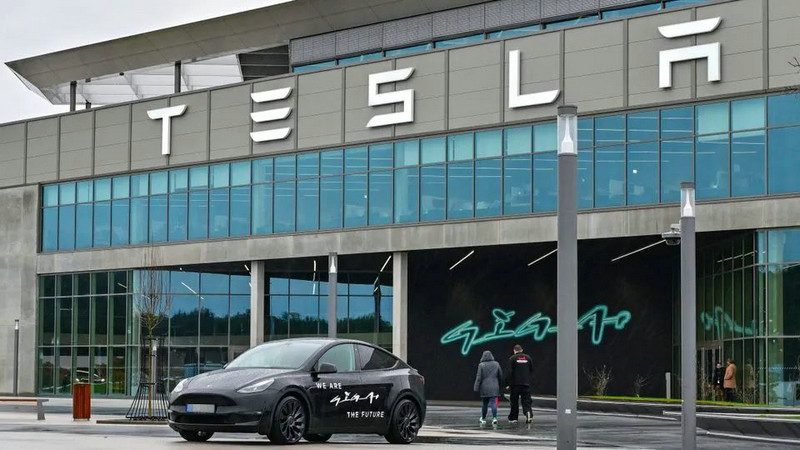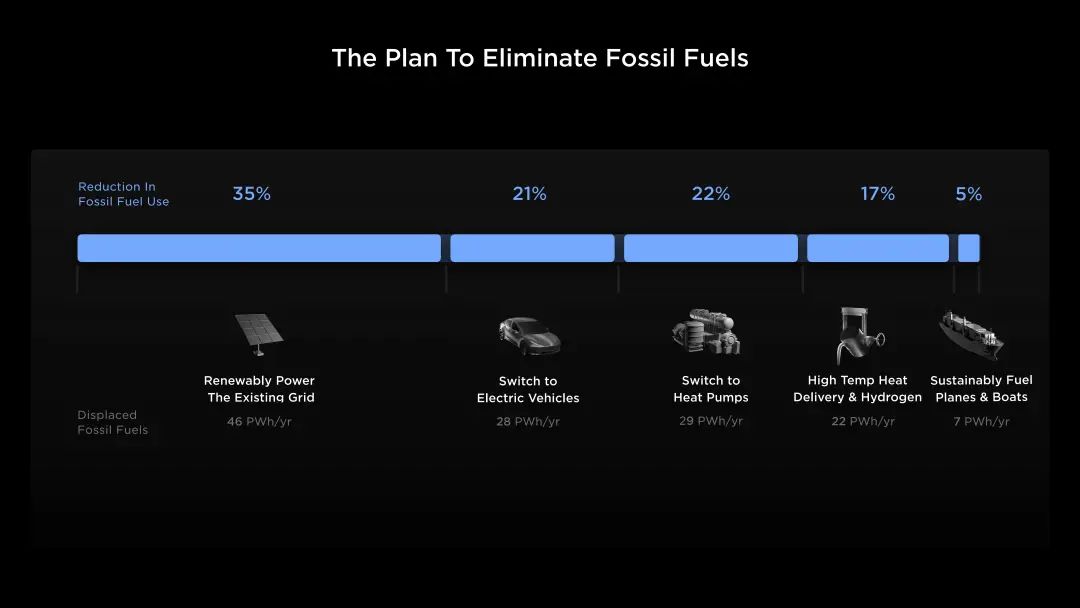"After Arson, Now 'Water Cutoff'? Tesla's Bitter Experience in Germany
In the early hours of March 5th, a high-voltage transmission tower near Tesla's German factory was set on fire, causing severe damage to the circuit. The factory has been shut down since then, suffering heavy losses.
The incident occurred in Grünheide, Germany, located in the eastern part of Brandenburg, near the capital city of Berlin.
The following day, a left-wing extremist group called the 'Volcano Organization' claimed responsibility for the arson, stating that their goal was to force Tesla to halt production.
Just a week after the fire, Tesla is now facing a 'water cutoff' threat in the same location. However, it's not an actual water cutoff but a protest campaign initiated by an environmental organization called 'Turn off Tesla's Faucet'.
 German environmentalists oppose Tesla's factory construction
German environmentalists oppose Tesla's factory construction
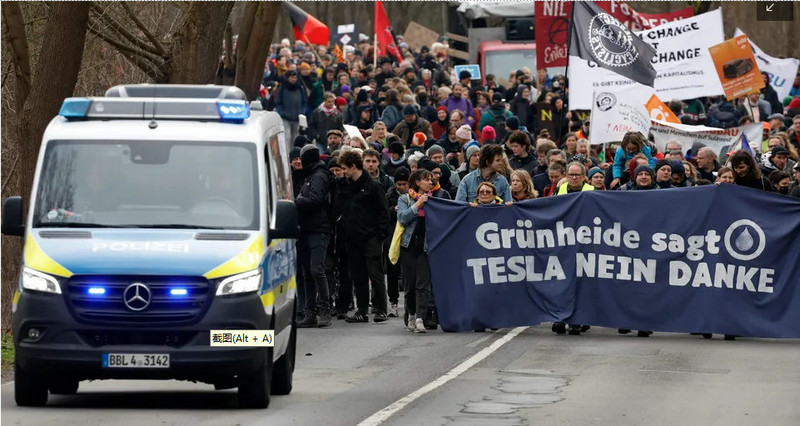 German environmentalists oppose Tesla's factory construction
German environmentalists oppose Tesla's factory construction
On the past Sunday, thousands of protesters gathered in Grünheide to oppose Tesla's expansion plans for the factory.
The cause of the protest is Tesla's plan to build a freight yard, warehouse, and a company kindergarten next to the 300-hectare factory site. To achieve this goal, approximately 100 hectares of forest would need to be cleared.
This sparked protests from environmental activists. Since the end of February, around 80 environmental activists have occupied the forest, building treehouses and setting up camps. The protesters have stated that the activities will continue indefinitely until it is confirmed that Tesla will not clear the forest.
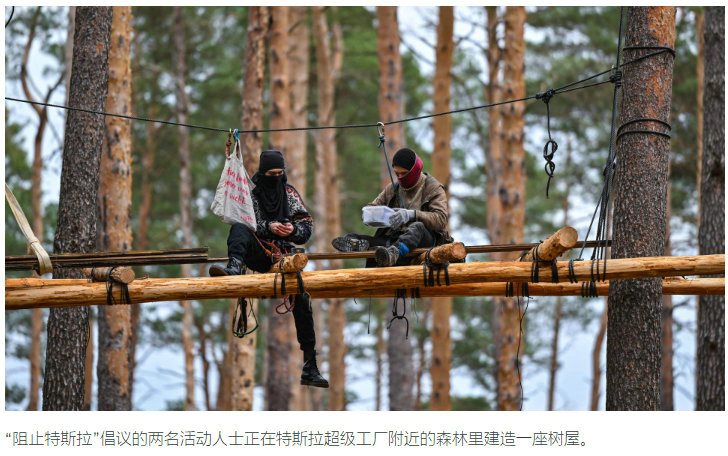 German environmentalists oppose Tesla's factory construction
German environmentalists oppose Tesla's factory construction
Meanwhile, Tesla argues that improving the infrastructure around the factory will bring 'tremendous benefits' to the local area.
According to reports, the majority of local residents oppose the plan, but there is also a portion of residents who support Tesla, believing that the company's construction will promote local development. As a result, both groups of residents have held demonstrations, and tensions have escalated. German media reports indicate that there were even people injured by batons on the day of the protest.
Following the arson case last week, Tesla expects the German factory to resume power supply on the 17th, and during the shutdown, over 1,000 vehicles cannot be produced daily. A Tesla spokesperson stated, 'This means a loss in the high six figures for us.'
Now, the protest activities are escalating with more participating groups, and it is difficult to predict what challenges Tesla will encounter."
Tesla's German Factory Faces Uphill Battle
In fact, Tesla has encountered numerous challenges in Germany. Since establishing its first European Gigafactory in Germany in 2019, the project has faced a series of protests and obstacles, with reasons ranging far and wide.
In January 2020, the German Nature Conservation Union argued that bats near the factory were in hibernation and should not be disturbed. Construction of the Tesla factory in Grünheide was forced to halt. As a result, Tesla relocated the bats to a World War II-era bunker nearby, with the presence of several media journalists as witnesses.
Subsequently, environmental organizations raised concerns about potential groundwater pollution from the Tesla factory. In response, Tesla submitted a comprehensive 4,000-page report, detailing that the approximately 10,000 concrete columns it had placed underground would not impact the groundwater source.
Furthermore, Tesla's car factory was accused of "water theft" from local residents. Local media estimated that the Tesla factory would consume around 3.6 million cubic meters of water annually, accounting for approximately 30% of the local water supply. To appease public anger, Tesla reduced its planned water consumption from 372 cubic meters per hour to 233 cubic meters per hour.
 German environmentalists oppose Tesla's factory construction
German environmentalists oppose Tesla's factory construction
Also in early 2020, environmental activists took Tesla to court, claiming that the construction of the Gigafactory would involve deforestation. However, Elon Musk pledged that for every tree cut down, Tesla would plant three more. The court ultimately ruled in favor of Tesla.
In 2021, environmental organizations argued that deforestation would impact the habitat of animals in the forest and once again took Tesla to court.
As a result, the car factory, originally planned to start production by July 1, 2021, faced continuous delays. It was not until early March 2022 that the Grünheide factory finally obtained approval from the state of Brandenburg.
However, the good fortune was short-lived. In April, the German Federal Environment Agency and Oder-Spree Water Authority discovered paint mixtures leaking from Tesla's paint shop. Subsequently, the local environmental organization Green League demanded the revocation of Tesla's factory permit until the necessary improvements were made to prevent hazardous substances from entering the groundwater.
In late September of the same year, a fire broke out at an outdoor recycling point northeast of Tesla's Grünheide factory, once again providing ammunition for environmental activists.
In summary, Tesla's experience in building a factory in Germany has been a "bitter tear." This is the epitome of the infamous "German speed."
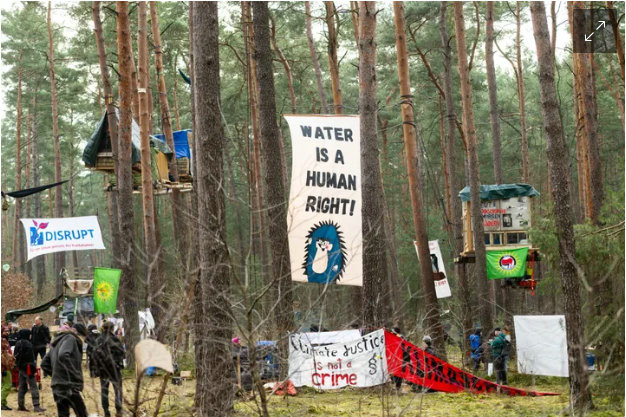 German environmentalists oppose Tesla's factory construction
German environmentalists oppose Tesla's factory construction
The above is the full content of "After Arson, Now 'Water Cutoff'? Tesla's Bitter Experience in Germany

